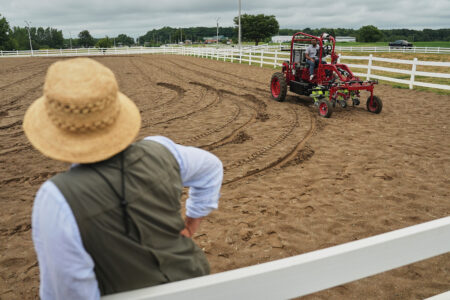Will electric tractors gain traction?
At pilot event for farmers, researchers see possibilities
EAST LANSING, Mich. — In the soft dirt of an indoor horseback riding ring last month, a group of farmers got ready to test drive a new piece of equipment: an electric tractor.
As they took turns climbing in — some surprised by its quick acceleration — they gave real-time feedback to the Michigan State University researchers who have been developing it for over two years.
The farmers remarked on the motor’s quiet whir. Most were intrigued, or at least open to the idea. Some were concerned that the battery on the underside of the carriage would mean a lower clearance over the field, while others worried that it would simply be too expensive.
“What we hope to do when we retire is we want to get everything electric on the farm. The tractor is the last electric implement to get,” said Don Dunklee, one of the farmers to provide feedback. He runs a small organic vegetable farm that’s relied on wind and solar for decades.
The market is fairly new, but some researchers and entrepreneurs think electric tractors will be ideal for small farmers who care about sustainability and want to market their products that way. The small cherry-red, open-cab machine is well-suited for tasks like weeding fields of specialty crops like carrots or asparagus, or squeezing between the tight rows of orchard trees. Farmers with solar panels can avoid the cost of diesel.
Agriculture is among the largest sources of climate-warming emissions worldwide. Though tractors are a small culprit, experts believe an environmentally friendly machine would still attract buyers interested in sustainability.
“There’s reduced emissions, but before you get there, you have to be solving for other problems,” including noise, ease of use and cost, said Derek Muller, business manager for battery electric systems at John Deere.
There are downsides — electric tractors are aimed at filling a niche, not overturning the status quo. And while battery technology has come a long way, they can’t last all day or match the massive horsepower of a diesel engine that sets giant tractors cruising through the sprawling grain and soybean operations of the Midwest.
In addition to battery limitations, there are other structural obstacles. Most farmers do not have fast electric chargers, nor do they have solar panels to supply those chargers with free electricity — diesel would need to be much more expensive for the economics to turn sharply in favor of electric. But companies are starting to see an opportunity.
“For John Deere, it is not the only solution,” Muller said. “It’s not going to be where we lead our efforts. It’s going to be one of many options.”
The company has built a small utility electric tractor prototype. It joins a limited set of offerings from other companies like Monarch Tractor, which started in 2019 with the aim to help farmers, who have traditionally struggled with razor-thin profits, save money, work sustainably and more efficiently.

